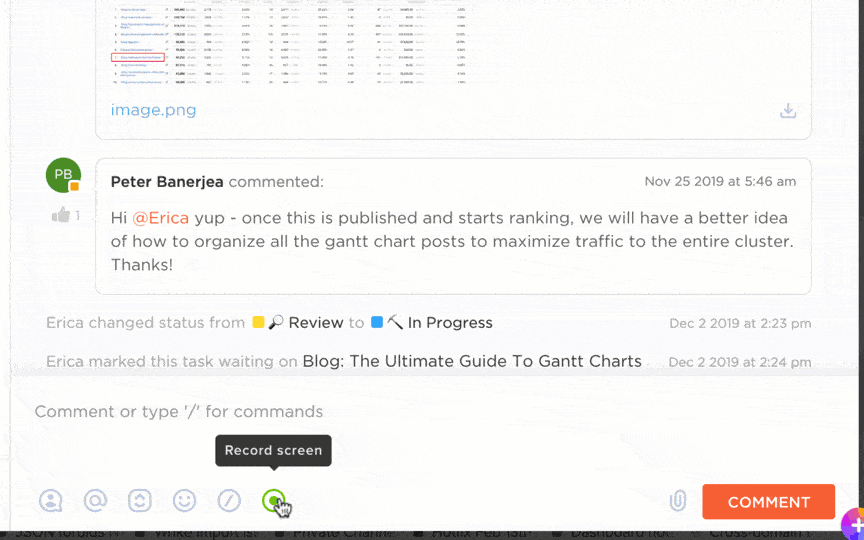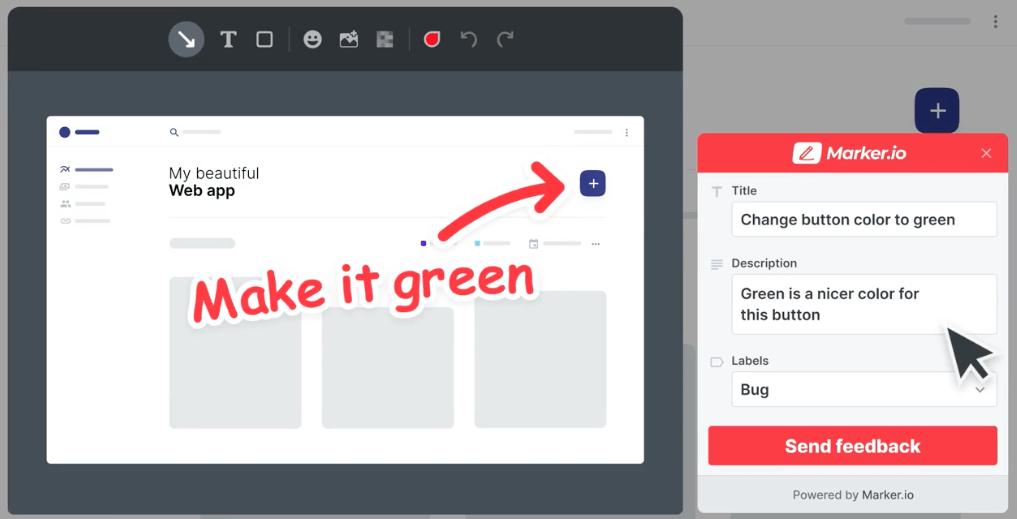

Lili van Belle is the marketing manager of Marker.io and a TEDx speaker. She combines her passion for great storytelling with a Master’s degree in Literature and a deep understanding of human psychology.
We’re all obsessed with efficiency, aren’t we?
Yet, one of the main struggles in companies today is the communication disconnect between teams. The pandemic did not improve things. 😷
Before COVID-19 hit, it was fairly easy to walk over to a colleague’s desk to ask for more information. Most of us did that daily! But now, a lot of teams work from home full-time. This means we need to be more precise and complete in our communication.
To make the communication surrounding QA testing and bug reporting better, Marker.io now seamlessly integrates with ClickUp!
How to Report a Bug in ClickUp
Bug reporting and QA testing methods are a slow process, even in ClickUp.
This is because no matter who spots the issue, it can take forever to send actionable feedback to your developers. And more often than not, some technical detail is missing.
This is the typical way teams report bugs:
- Spotting a bug on your website
- Taking a screenshot
- Opening ClickUp and creating a new task
- Pasting the screenshot in
- Annotate screenshot inside ClickUp
- Typing out long explanations
- Manually adding technical info (and probably forgetting some 😅)
- Getting a message from your devs to explain more (you know, when they say, “if it can’t be reproduced, it doesn’t exist!”)
You want to deliver complete and actionable bug reports to your developers, so you go through these motions.
But it can be done a whole lot easier.
Bonus: Incident Report Templates!
What Does a Perfect Bug Report Look Like in ClickUp?
There are several elements that make up the perfect bug report, and there is nothing you should leave out if you want your developers to resolve it efficiently. 😅
Let’s take a look at the “perfect bug report template” list below. Download the template here.
Title and description
Keep it brief and to the point. Always use the terms you agreed on internally.
Does your team always use “cart?” Don’t use “basket” in your bug report!
Visual proof
A picture is worth a thousand words. Although it might not be enough, a screenshot or a video will help your developers understand the problem better and faster.

Environment data and URL
Make it easy for your developers to spot the problem by including the URL of the page where you found the bug.
Also, depending on your browser, operating system, zoom level, and screen size, websites may behave differently from one environment to another. So make sure to always include these. Big time saver!
Console logs
When things go wrong in a page script, resulting in a bug or an issue, it gets recorded in the console logs. You can find these when “inspecting” a page and taking a screenshot of that bit.

Steps to reproduce
A screenshot is proof that you had a problem, but keep in mind that your developer might not be able to reproduce the bug. Make sure to describe, with as much detail as possible, the steps you took before you encountered the bug.
Create the Perfect Bug Report in Seconds With Marker.io
Marker.io for ClickUp wants to help you become more efficient in this process, without forcing you to pay for yet another tool to track bugs!

ClickUp is amazing for bug tracking and Marker.io is a connector between your site and your ClickUp folders. You don’t have to leave your website anymore to report issues, you don’t need to use several tools and you can work a lot faster.
How does it work with Marker.io?
Marker.io is all about reducing unnecessary back-and-forth between teams. Now, let’s create a more efficient workflow!
- Connect your ClickUp account to Marker.io
- Install the widget on your site
- Send visual and developer-ready bug reports straight to your ClickUp folders
- Keep hunting for more bugs!
You never had to leave the website and have created a perfect bug report in seconds.
As you can see, the fields inside the widget form actually mirror all your ClickUp fields, even Custom Fields! Your widget form is always up to date and synced between ClickUp and Marker.io
When you check your ClickUp folder, you will see the issue you created through the Marker.io widget. This issue has all the information your developers need to act quickly to squash those bugs… Let’s take a look at the created issue!

- The issue has a clear title
- There is a functional description
- Useful steps to reproduce
- It has the information of the reporter
- The issue has the URL where the screenshot was captured
- The console logs are included.
- The technical environment information is all there
- The issue has visual proof: an annotated screenshot is attached
You did not have to hunt this information down and your developers now have everything they need. They won’t need to waste time trying to fill in any gaps!
We understand that not everyone is a developer and that most people tend to forget to add viewport, JavaScript console errors, and other technical information. So we add the URL, environment data, and console log recordings for you 😉
Developers are happy, and non-developers spend less time reporting. Everyone is more efficient. That is why the bridge between technical and less technical teams must be made stronger!
Simplify Your Bug-Reporting Processes
Yes, we are all obsessed with productivity!
With the new Marker.io integration for ClickUp, you can make the QA testing and bug reporting workflow more efficient too.
Let your internal and external reporters submit detailed and complete bug reports straight into ClickUp, without leaving their workflow. It is all about bridging that gap between your technical and less technical teams while increasing productivity.
Let every one do the work they do best!
For more information, check out the Marker.io integration for ClickUp here.


